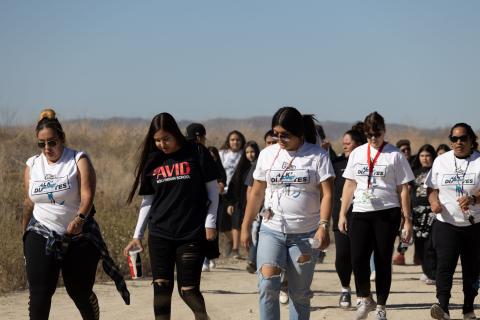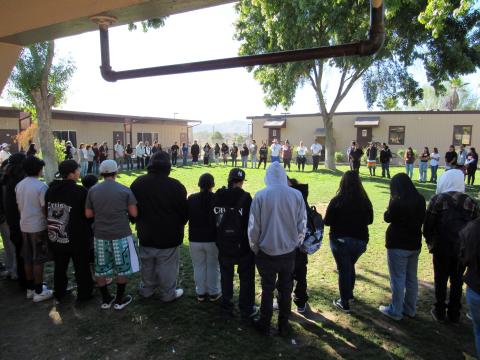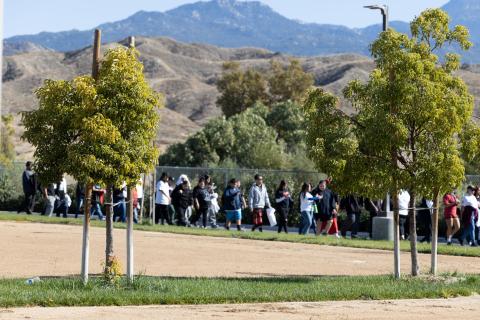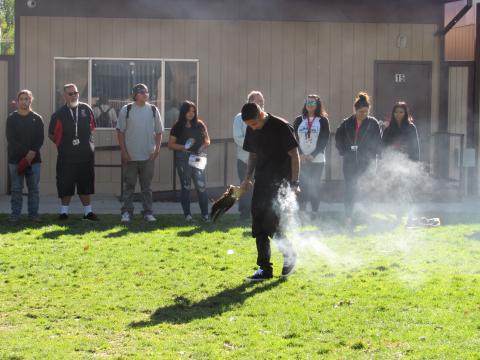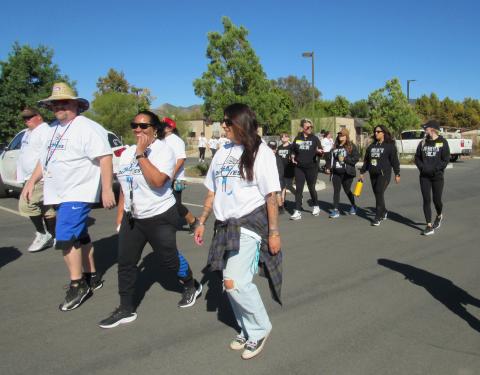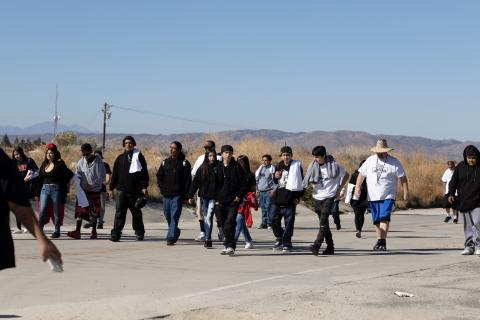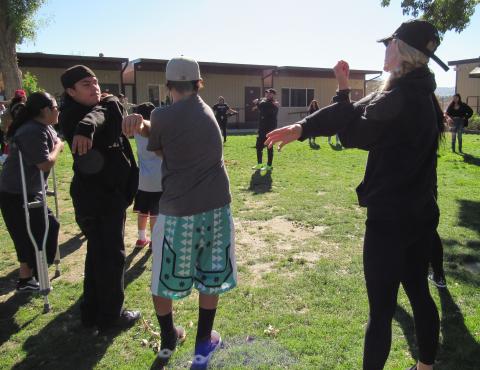Initiated by school nurse Camille Diaz, Noli students and staff participated in its first annual walk to bring awareness to the disease of diabetes. Very prevalent in Indian Country, the disease often can be controlled through proper diet and exercise. This was the message shared with 6-12 grade students on the morning of Nov. 9 as part of November’s National Diabetes Awareness Month.
Diaz partnered with Riverside-San Bernardino County Indian Health Inc.’s Diabetes Program department to help deliver important information about prevention and treatment of the disease that affects so many. The program’s tagline is “Better Health One Step at a Time.” Diaz has served on the RSBCIHI board since April of 2021 as its Soboba delegate.
She said that last year, participants went to Morongo for their Canyon Walk and thought it would be good to have their own local walk to educate the youth about healthy eating habits and exercise. “The sooner we start that education, the better chance we have of preventing it,” Diaz said.
Diabetes means your blood sugar is too high. Type 2 is the most common type in American Indian and Alaska Native people and can occur at any age. Symptoms can be severe, mild or nonexistent, which is why regular testing is important. Some signs are increased thirst or hunger, fatigue, increased urination, unexplained weight loss and/or blurred vision.
Diagnosed with Type 2 diabetes in 2009, Diaz recalls her symptoms of having no energy and other things that can be indicative of many other health issues. She made lots of changes to her lifestyle at that time but she still needed medication. For the past two and a half years she has been able to control her A1C level with diet and exercise and has not needed any medications. “Fast-paced walking is a good exercise to get the metabolism going,” Diaz said.
Chela Delgado has been Noli’s campus supervisor for the past 10 years, after spending 23 years with San Jacinto Unified School District. She was diagnosed with Type 2 diabetes about 10 years ago and tried to do what she could to avoid having to take medication. “Had I known more about good eating habits, I could have done more but it’s under control now with some medication,” she said. “The best thing to do is keep on top of it and don’t let it get out of hand.”
Noli’s Lunch Attendant Tanya Briones-Rivera and Noli School Board President Antonia Briones Venegas are first cousins and say they share many family members who have diabetes. “I get tested every year and exercise regularly to keep it at bay,” Briones-Rivera said. Venegas, who has sons attending Noli, was pleased with the organized event. “Teachers get that time with our kids outside of the classroom while supporting something that affects our community’s health,” she said.
Principal Donovan Post said high blood pressure, heart disease and diabetes are prevalent on his mother’s side of the family. “As a young kid I always heard the adults talk about the ‘Indian disease’ and learned it meant diabetes,” he said. Post said some of his relatives are good at controlling it and when he was diagnosed three years ago, he began to exercise more and has been able to keep his A1C under control. “I started walking 10,000 steps a day and have been able to reduce my medication,” he said. “It was a huge regimen to start but I don’t miss the things I used to eat and drink.”
Post believes, like many others, that the introduction of processed and refined foods and liquor to Native Americans by Europeans who came to America, is what led to the disease becoming so common among them as their bodies were not used to non-natural food and drink. “This walk is a good thing because we need to educate our young people on the best way to prevent diabetes,” he said. “There’s a balance between healthy and tasting good. I love how we ate growing up on the reservation with lots of cheese and pasta and starchy foods. But now there are many sugar-free items available; you don’t have to go without.”
He said working to prevent or control diabetes doesn’t mean a person can’t go out to eat or enjoy their favorite foods. It’s just important to pay attention to schedules and avoid too many carbs, fat and sugar additives.
Post said when Diaz approached administration with the idea of this walk, it was a no-brainer. School staff was happy to partner with RSBCIHI and Tribal Elders to make it happen. Soboba Casino Resort Graphic Specialist Wade Abbas worked with Diaz to design the t-shirts that were given to all participants. SCR donated 210 shirts to be sure all the students, staff and other walkers got one to wear during the approximately 2.5 round-trip walk from the school’s campus to the old potato fields on the reservation.
The Diabetes Program stressed the value of walking as our bodies were meant to get up and walk. It helps the mind, body, spirit and emotions and can provide more energy by keeping blood sugar, blood pressure, cholesterol and weight in good ranges. Staying active also can keep muscles and bones strong. The program also shared flyers about different aspects of diabetes and ways to improve health. One stated that “eating healthy doesn’t mean you need to buy costly foods.” Healthy foods are those in a more natural state that are low in sodium and added sugars, preferably fresh, grown and gathered foods. Examples include carrots, onions, whole grain bread and pasta, apples, oranges, berries and protein-rich foods such as beans, eggs, meat, fish, poultry and nuts.
Jonell John has represented the Cahuilla Band of Indians, Mountain Cahuilla near Anza, as their RSBCIHI delegate since 2007 and was eager to participate in the morning walk. “I’m really supportive of giving these kids a solid foundation and getting them started with learning healthy habits,” John said. “I’m 48 and I’m just starting to learn how important it is to exercise regularly.” She said she walks every morning and that both her sons are super fit so she knows the benefits of a healthy lifestyle.
Before the start of their second period classes, students were welcomed to the quad area by Camille Diaz who told them, “Today’s a good day; we’re going to have a lot of fun.” After gathering in a circle, Damon Miranda provided a blessing to all. They were then invited to sit for a presentation by Diabetes Program Director Holly Brawner who quizzed the students on their knowledge of risk factors, prevention and what is meant by healthy eating and intentional movement. Wearing her own t-shirt that read, “Movement is Medicine” she explained some of the risk factors leading to diabetes are being inactive, having high blood pressure, smoking, having a BMI (Body Mass Index) above 23 and a family history of the disease.
Diabetes Program Fitness Specialist Dwayne Boyd shared about the importance of exercise and then led everyone in some stretches to get ready for the walk itself. He stressed the importance of always staying hydrated as well. RSBCIHI offers weekly classes at its sites, which includes the one at Soboba. There are also fitness gyms at two sites, including Soboba and Tribal members can get individual guidance on nutrition with registered dieticians on staff.
RSBCIHI’s “Nourishing Our Communities” Farmers Market will be Friday, Dec. 1 from 10-11 a.m. at the old Soboba Casino at 23333 Soboba Road in San Jacinto. Drive through to receive fresh fruits and vegetables and shelf stable foods on a first come, first served basis.
For more information, 951-849-4761, ext. 1151.


